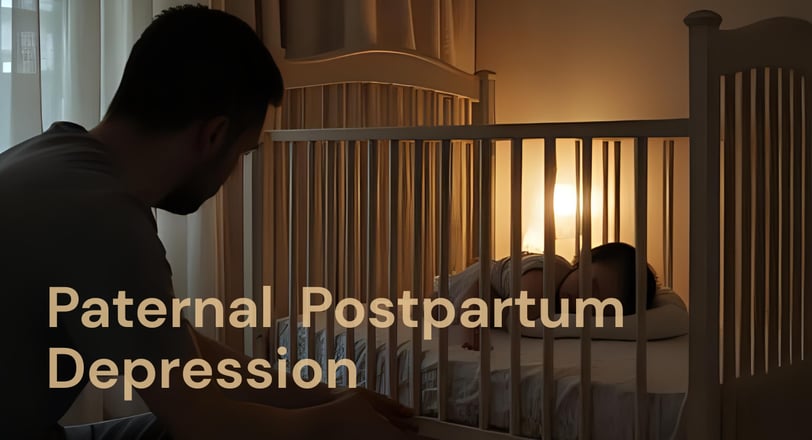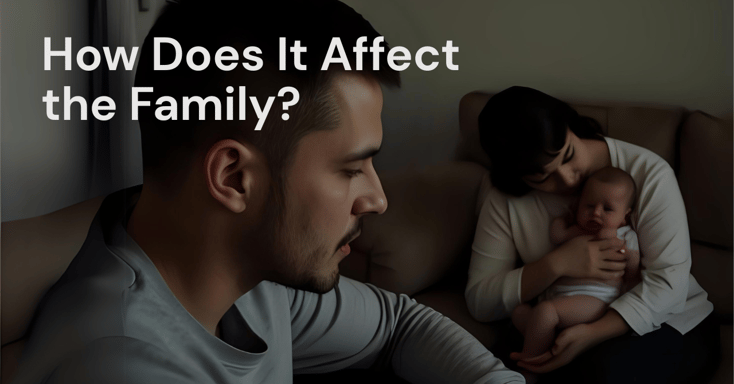Can Fathers Experience Postpartum Depression Too?
5/22/20254 min read
What Is Paternal Postpartum Depression?
Paternal postpartum depression refers to depressive symptoms in fathers or non-birthing partners following the birth of a child. It typically arises within the first year after childbirth but may surface as early as the first few weeks postpartum.
Research suggests that up to 10% of new fathers experience significant symptoms of depression during the postpartum period—and those numbers climb even higher when the mother is also struggling with PPD.
This isn't about occasional stress or new-dad jitters. Paternal PPD can affect a father’s ability to bond with the baby, support their partner, and engage meaningfully with everyday life.
What Causes Postpartum Depression in Fathers?
Just as with mothers, paternal postpartum depression stems from a complex web of biological, psychological, and social factors.
1. Hormonal Shifts
It may come as a surprise, but fathers also undergo hormonal changes when they become parents. Testosterone levels often dip, while oxytocin and prolactin levels rise—biological cues that promote bonding and caregiving. But lower testosterone has been linked to increased vulnerability to depression.
Cortisol, the stress hormone, also fluctuates in new fathers, particularly in those who are sleep-deprived or anxious. These biochemical changes, while natural, can alter mood regulation.
2. Sleep Deprivation and Fatigue
Anyone who's cared for a newborn knows that sleep becomes a rare luxury. Chronic exhaustion impairs emotional resilience, increases irritability, and can disrupt neurotransmitter function. When paired with the pressures of work, finances, and relationship dynamics, fatigue becomes fertile ground for depressive symptoms.
3. Feelings of Exclusion or Identity Loss
Fathers often report feeling left out during the early bonding phase between mother and baby. They may struggle to find their place or feel distant from the experience, especially if breastfeeding limits their involvement. On top of that, societal expectations still paint men as stoic providers—discouraging them from voicing emotional struggles.
Peace Temple’s inclusive family therapy services are specifically designed to support both parents and foster shared emotional well-being in the household.
4. Relationship Tension
The transition to parenthood puts a strain on most relationships. Emotional distance, reduced intimacy, and disagreements over parenting styles can create conflict—and in turn, deepen depressive feelings in fathers already struggling to adapt.
5. History of Mental Health Issues
Men with a personal or family history of depression or anxiety are at higher risk for developing paternal PPD. When pre-existing vulnerabilities meet the chaos of new parenthood, symptoms often intensify.
Signs and Symptoms in Men
Men tend to express depression differently than women. While new mothers might exhibit classic symptoms like sadness and tearfulness, fathers may externalize their distress or mask it entirely.
Common symptoms include:
Persistent irritability or anger
Emotional numbness or detachment
Increased substance use (alcohol, nicotine, etc.)
Changes in sleep or appetite
Low motivation or energy
Risk-taking behaviour
Withdrawal from family or social interactions
Feelings of inadequacy or failure
Workaholism as a form of avoidance
In more severe cases, fathers may experience panic attacks, thoughts of self-harm, or even suicidal ideation. If these symptoms persist for more than two weeks and interfere with daily life, it's time to seek support.
At Peace Temple, we offer non-judgmental, father-friendly counselling options—because emotional struggles don’t discriminate by gender.
When we talk about postpartum depression (PPD), the image that often comes to mind is that of a new mother, overwhelmed, tearful, and struggling to bond with her baby. But what if we told you that fathers—yes, fathers—can experience postpartum depression too?
Though less commonly discussed, paternal postpartum depression (PPPD) is a very real condition. It's not just a byproduct of stress or sleep deprivation, nor is it an emotional footnote in a mother-centric story. It's a standalone mental health challenge, with unique triggers, symptoms, and consequences that deserve serious attention.
At Peace Temple, we see an increasing number of fathers grappling with silent emotional battles after childbirth. Many don’t even realize what they’re experiencing has a name—let alone that help is available.




How Does It Affect the Family?
Paternal PPD doesn’t exist in a vacuum. When a father is struggling mentally, the entire household feels the impact.
The partner relationship often suffers, creating a feedback loop that can worsen maternal PPD or anxiety.
Children may pick up on emotional cues, even at a very young age. Studies have shown that untreated paternal depression can affect a child's cognitive and emotional development.
Fathers themselves may miss out on forming strong early bonds with their child—something that benefits both parent and baby in the long run.
This ripple effect makes early intervention not just a personal choice, but a family necessity. Peace Temple’s holistic family support model is designed with these intersections in mind.
Breaking the Silence: Why It’s Often Undiagnosed
Despite the prevalence of paternal PPD, it remains largely undiagnosed. Why? One word: stigma.
Cultural norms have long discouraged men from speaking about emotions. Many fathers feel pressure to "be the rock" for their partner and child, believing that admitting to depression is a sign of weakness or failure.
This silence is not only harmful—it’s unnecessary. Mental health care is self-care, and no father should have to navigate these feelings alone.
Getting Help: What Fathers Can Do
If you or someone you love might be experiencing postpartum depression as a father, don’t wait for a crisis. Support is available, and healing is absolutely possible.
Here are some steps to take:
Talk to your partner, a friend, or a therapist
Schedule a mental health screening (available at Peace Temple)
Join a new dads' support group—online or in person
Prioritize rest and healthy routines
Avoid self-medicating with alcohol or substances
Set aside time for one-on-one bonding with your baby
Remember, getting help isn’t just for you—it’s for your entire family.
Final Thoughts: Fathers Matter Too
Postpartum depression in fathers is real, valid, and deeply impactful. It doesn’t mean you’re weak, broken, or unfit to be a parent. It means your brain and body are adjusting to a monumental life change—and sometimes, they need a little extra support to recalibrate.
At Peace Temple, we stand firmly behind the idea that parental mental health is a family issue, not a gendered one. When fathers are emotionally well, their partners thrive, their babies thrive, and so do they.
Because supporting dads is just another way we support families.
